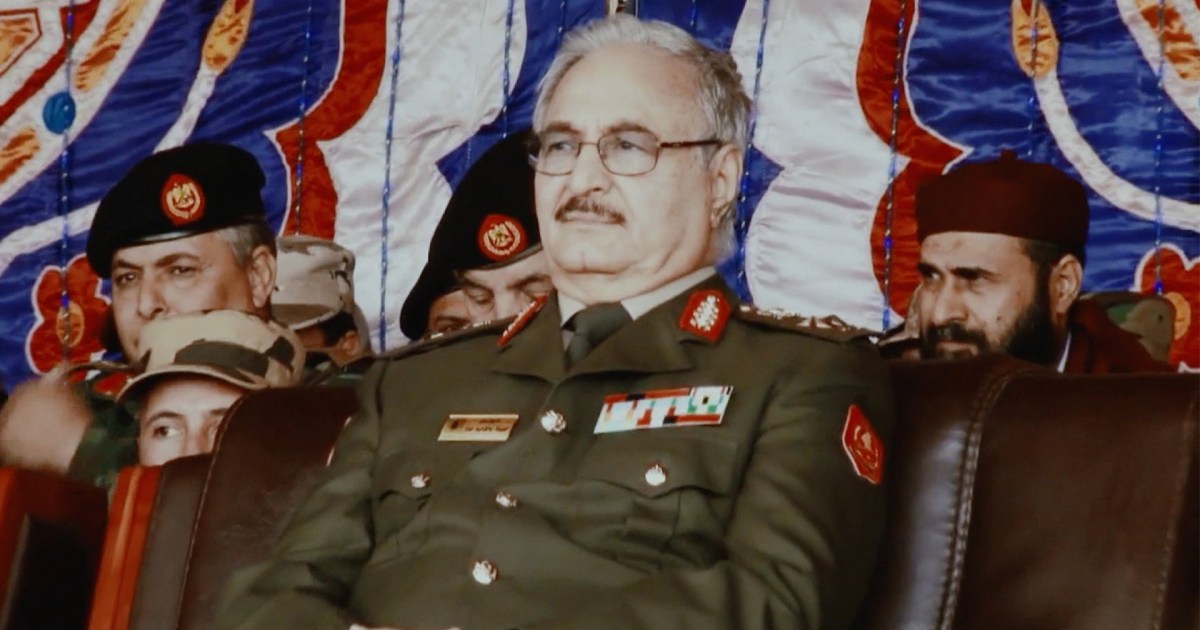Since the fall of the Gaddafi regime, Libya has become an arena for the ploys of international powers, and Haftar - with Arab and Western support - played a role in igniting a war between the sons of the same nation, bringing the country rich in its oil wealth into a state of division and chaos.
The documentary film touched on the situation in Libya through the sequence of events. After Gaddafi’s rule was toppled, those who revolted against him did not lay down their arms, and the country was subsequently divided against itself, and 3 cities fought over power and oil sites: in the west, Tripoli and Misurata on one side, and on the other side Benghazi. in the East.
The city of Tarhuna (southeast of the Libyan capital, Tripoli) reflected the state of chaos in that period, as a militia close to the Salafist movement tightened its grip on the city, and committed massacres and arbitrary arrests there, and even olive fields turned into mass graves.
Libya entered a dangerous stage with the sudden appearance of Haftar, who appointed himself commander of the Libyan army, and turned into a strong and mysterious figure.
The key to the mystery lies in the career of the man, who was a colonel during the Gaddafi regime, and on his order he launched an attack on Chad in 1987, but he was captured, and at that time the CIA recruited him to overthrow Gaddafi, according to an American newspaper.
After failing in his mission, he chose to reside in North Virginia, America, and his sons owned many real estate there.
The former UN Special Envoy to Libya, Ghassan Salame, says that Haftar started at that time arousing the interest of external parties, especially the United States and France, who focused on his potential role in confronting terrorism.
For his part, French Foreign Minister Jean-Yves Le Drian acknowledges that his country supported Haftar's army, which he said had "combated terrorism" in Derna, Benghazi, Sirte and others.
Haftar and the Wagner militia
Haftar made moves on the Libyan arena, and launched a military operation under the name "Road Map", in which he announced the control of his forces over vital military sites. He also announced - in a statement - freezing the work of the General National Congress and the government and proclaiming the constitution, which the government rejected at the time and considered it a coup.
He also launched Operation Dignity of Libya, and a part of eastern Libya surrounded him, but Tripoli and Misrata rejected his followers and considered him a new tyrant.
Then war broke out;
Libya plunged into an open war, and international conferences and reports of the UN Security Council followed suit, but nothing changed on the ground.
Haftar was not satisfied with that, as in 2019 he launched a major attack on the forces of the internationally recognized Government of National Accord and became at the gates of the Libyan capital, and all Misurata fighters went to Tripoli to help the forces of the internationally recognized Government of National Accord.
The representative in the Libyan Parliament, Abu Bakr Ahmed Saeed, says that everyone was surprised by the entry of Haftar’s forces into Tripoli, and the question at the time was about who supported this force that headed from east to west, which is the question answered by the commander of the Sirte and Al-Jafra operations room, Major General Ibrahim Bait Al-Mal , who confirmed - in his statement to the documentary program - that they confirmed the presence of forces from the Russian private company "Wagner" who were fighting alongside Haftar's forces in the battle of Tripoli Airport.
A report to the UN Security Council also established “the presence of the Wagner militia in Libya, and that it reports on its military activity to its headquarters in St. Petersburg, Russia.” The report confirms the presence of Wagner in Tarhuna at the gates of Tripoli, especially around the three main Libyan oil sites.
The Sudanese are fuel for war in Libya
The documentary also highlighted the UAE's role in training Sudanese and sending them to fight in Libya after granting them work contracts.
In 2019, Sudanese fighters appeared on Libyan soil alongside Haftar's forces.
Abdel-Ilah - a Sudanese who was tricked into fighting in Libya - recounts how he and others received training for 4 months in the Emirates, and then transferred with 600 other Sudanese to Libya without informing them of any details.
Although an international embargo on arms exports to Libya has been in force for 40 years, weapons have flowed into Libyan territory and Russian tanks, American heavy artillery and mobile missile launchers have appeared from Serbia.
The air and land borders were open as long as Haftar controlled them.
In 2019, Libya entered another era, and Ghassan Salameh confirms that the government of Fayez Al-Sarraj was at that time confronting the Haftar group, which was supported by militias and mercenaries from other countries, and that Al-Sarraj sought help from several countries, including the United States, Algeria and Turkey, and only found Turkey, which became the largest supporter of the Government of National Accord. And it provided the fighters with drones that were able to tip the conflict in favor of Tripoli, as Haftar was forced in the spring of 2020 to withdraw his forces from western Libya.

